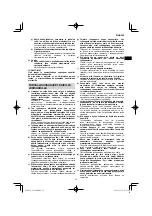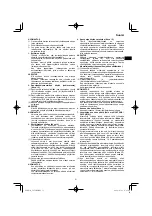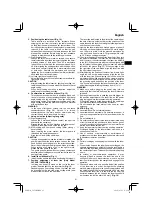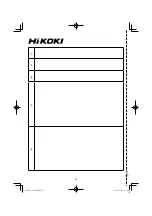
English
60
capacity. The extension cord should be kept as short as
practicable.
4. Releasing the locking pin (Fig. 3)
When the power tool is prepared for shipping, its main
parts are secured by a locking pin.
Move the handle slightly so that the locking pin can be
disengaged.
During transport, lock the locking pin into the gear case.
5. Attach the dust bag to the main unit (Fig. 1)
6. Installation (Fig. 4)
Ensure that the machine is always
fi
xed to bench.
Attach the power tool to a level, horizontal work bench.
Select 8 mm diameter bolts suitable in length for the
thickness of the work bench.
Bolt length should be at least 25 mm plus the thickness
of the work bench.
For example, use 8 mm × 65 mm bolts for a 25 mm thick
work bench.
7. Base holder adjustment (Fig. 5)
Loosen the 6 mm bolt with the supplied 10 mm box
wrench. Adjust the base holder until its bottom surface
contacts the bench or the
fl
oor surface.
After
adjustment,
fi
rmly tighten the 6 mm bolt.
8. Check to see that the lower guard operates
smoothly
CAUTION
○
This slide compound miter saw is equipped with a saw
head lock as safety device.
○
To lower the saw head to cut, the lock must be released
by pressing the lock lever with your thumb.
(1) When you push down the handle while pushing the lock
lever, check that the lower guard revolves smoothly
(
Fig. 6
).
(2) Next, check that the lower guard returns to the original
position when the handle is raised.
9. Oblique angle
Before the power tool is shipped from the factory, it is
adjusted for 0°, right angle, left 45° bevel cutting angle
with the 8 mm bolt (A) and 8 mm bolt (B).
When changing the adjustment, change the height of the
8 mm bolt (A) or 8 mm bolt (B) by turning them.
When changing the bevel angle to the left 45° and over,
pull the set pin on the direction shown in
Fig. 7-a
and
incline the motor head to the left.
When changing the bevel angle to the right, pull the set
pin on the direction shown in
Fig. 7-a
and incline the
motor head to the right.
When adjusting the motor head to 0°, always return the set
pin to its initial position as shown in
Fig. 7-b
.
10. Checking the saw blade lower limit position
Check that the saw blade can be lowered 10 mm to 11
mm below the table insert.
When you replace a saw blade with a new one, adjust
the lower limit position so that the saw blade will not cut
the turntable or complete cutting cannot be done.
To adjust the lower limit position of the saw blade, follow
the procedure (1) indicated below. (
Fig. 8
)
Furthermore, when changing the position of a 8 mm
depth adjustment bolt that serves as a lower limit position
stopper of the saw blade.
(1) Turn the 8 mm depth adjustment bolt, change the height
where the bolt head and the hinge contacts, and adjust
the lower limit position of the saw blade.
NOTE
Con
fi
rm that the saw blade is adjusted so that it will not
cut into the turntable.
Using an item such as a steel square, match the upper
surfaces of the base surface and sub table. Adjust the
vertical level of the sub table by turning the 8 mm height
adjustment bolt. After the adjustment, secure the holder
with the 6 mm bolt on the rear of the base, and secure the
6 mm wing bolt of the sub table.
PRIOR TO CUTTING
1. Cutting a groove on the guard
Holder (A) has a guard (see
Fig. 11
) into which a groove
must be cut when using the tool for the
fi
rst time. Loosen
the 6 mm knob bolt to retract the guard slightly.
After placing a suitable wooden piece to sit on the
fence and the table surfaces,
fi
x it with the vise. Slide
the motor head backwards to the end. Then tighten the
slide securing knob. After the switch has been turned on
and the saw blade has reached maximum speed, slowly
lower the handle to cut a groove on the guard. (See
Fig. 21
)
CAUTION
Do not cut the groove too quickly; otherwise the guard
might become damaged.
Do not use slide cutting for grooving tasks.
PRACTICAL APPLICATIONS
WARNING
○
To avoid personal injury, never remove or place a
workpiece on the table while the tool is being operated.
○
Never place your limbs inside of the line next to warning
sign while the tool is being operated (see
Fig. 10
). This
may cause hazardous conditions.
CAUTION
○
It is dangerous to remove or install the workpiece while
the saw blade is turning.
○
When sawing, clean o
ff
the shavings from the turntable.
○
If the shavings accumulate too much, the saw blade from
the cutting material will be exposed. Never subject your
hand or anything else to go near the exposed blade.
1. Switch operation
The tool will not start unless the Lock-o
ff
button is
pressed while the switch is pulled back.
The
Lock-o
ff
button can be engaged by pressing it from
the left.
After the switch is on, the saw blade will continue to
operate as long as you pull on the switch trigger, even if
you release the Lock-o
ff
button.
When the switch is released, the Lock-o
ff
button
automatically disengages to prevent inadvertent motor
startup.
WARNING
Never lock the Lock-o
ff
button in depressed position.
Pulling back the switch would then cause the tool to
suddenly start operating, which could result in injury.
2. Using the Vise Assembly (Standard accessory)
(Fig. 13)
(1) The vise assembly can be mounted on either the left
fence {Fence (B)} or the right fence {Fence (A)} by
loosening the 6 mm wing bolt (A).
(2) The screw holder can be raised or lowered according to
the height of the workpiece by loosening the 6 mm wing
bolt (B). After the adjustment,
fi
rmly tighten the 6 mm
wing bolt (B) and
fi
x the screw holder.
(3) Turn the upper knob and securely
fi
x the workpiece in
position.
WARNING
Always
fi
rmly clamp or vise to secure the workpiece to
the fence; otherwise the workpiece might be thrust from
the table and cause bodily harm.
CAUTION
Always
con
fi
rm that the motor head does not contact the
vise assembly when it is lowered for cutting. If there is
any danger that it may do so, loosen the 6 mm wing bolt
and move the vise assembly to a position where it will not
contact the saw blade.
000Book̲C8FSHE.indb 60
000Book̲C8FSHE.indb 60
2019/05/31 9:27:42
2019/05/31 9:27:42













































